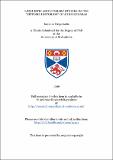Files in this item
Linguistic and literary studies in the "Epitome historion" of John Zonaras
Item metadata
| dc.contributor.advisor | Whitby, Michael | |
| dc.contributor.advisor | Magdalino, Paul | |
| dc.contributor.author | Grigoriadis, Iordanis | |
| dc.coverage.spatial | 283 p. | en_US |
| dc.date.accessioned | 2018-07-17T13:46:47Z | |
| dc.date.available | 2018-07-17T13:46:47Z | |
| dc.date.issued | 1996 | |
| dc.identifier.uri | https://hdl.handle.net/10023/15491 | |
| dc.description.abstract | John Zonaras, a high-ranking judge, subsequently a monk in the twelfth-century Byzantine Empire, is well known as author of a universal history that stretches from the Creation to his own time and a collection of canon law. His history is regularly used as a historical source, not only for recent and contemporary events but also as the medium through which information from lost early historians (in particular Cassius Dio) is preserved, while his work on canon law shows an uncommon knowledge of the practices of the Byzantine Church. The language of these works, however, has not yet received detailed study. It is the intention of this thesis to remedy this deficiency, thereby attempting to identify and highlight the most important literary features of Zonaras' writings. The Introduction covers a survey of the intellectual currents in the twelfth century, to be followed by a biography of Zonaras and the description of the island of St. Glyceria, the place of his retirement, as it appeared during our visit in summer 1993. Part one studies the prooimion of Zonaras in relation to the prooimia of other eleventh and twelfth-century Byzantine historians. Part two entails a comparative study of Zonaras' history with the work of contemporary historians and non-historians and discusses the subject of the homogeneity of his language. Part three deals with specific linguistic features of Zonaras' style such as wordplay, humour and irony, the use of proverbs, linguistic borrowings from contemporaries, etc. The discussion ends with a Conclusion and an Appendix on the so-called Lexicon Tittmarmianum, a major work of lexicography of disputed authenticity which we argue is probably a genuine work of Zonaras. From the studies in this thesis, it emerges that Zonaras' language reveals the talent of an author who has been unjustly neglected and certainly deserves further attention and exploitation for the benefit of both historians and linguists. | en_US |
| dc.language.iso | en | en_US |
| dc.subject.lcc | PA5085.E7Z5G8 | en |
| dc.subject.lcsh | Greek literature, Modern | en |
| dc.title | Linguistic and literary studies in the "Epitome historion" of John Zonaras | en_US |
| dc.type | Thesis | en_US |
| dc.contributor.sponsor | University of St Andrews | en_US |
| dc.contributor.sponsor | Student Awards Agency for Scotland | en_US |
| dc.type.qualificationlevel | Doctoral | en_US |
| dc.type.qualificationname | PhD Doctor of Philosophy | en_US |
| dc.publisher.institution | The University of St Andrews | en_US |
This item appears in the following Collection(s)
Items in the St Andrews Research Repository are protected by copyright, with all rights reserved, unless otherwise indicated.

